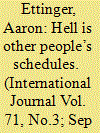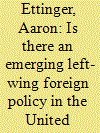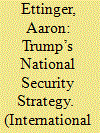|
|
|
Sort Order |
|
|
|
Items / Page
|
|
|
|
|
|
|
| Srl | Item |
| 1 |
ID:
136447


|
|
|
|
|
| Summary/Abstract |
In the mid-1990s, unprecedented interventions by private companies specializing in the delivery of military muscle and know-how began altering the dynamics of local conflicts. Since then, private military and security companies have transformed the dynamics of local security delivery around the world, most prominently in Iraq and Afghanistan. In the process, the private military industry has generated plenty of profit and attention, both alarmist and analytical. Two totems of research into the burgeoning industry and its implications are Corporate Warriors by P.W. Singer and The Market for Force by Deborah Avant. Nearly a decade after their publication, these books remain among the most in-depth and sustained treatments of the industry. This essay looks back at the arguments presented in each book and their influence on subsequent research on military privatization.
|
|
|
|
|
|
|
|
|
|
|
|
|
|
|
|
| 2 |
ID:
147847


|
|
|
|
|
| Summary/Abstract |
Since 2001, Canada has participated in multilateral security operations in Afghanistan and Libya, and as part of the anti-ISIS coalition. Canada’s contributions have been the sum of eleven distinct time-delimited missions ranging from six months to four years. Until now, this variation in strategic duration has drawn little scholarly attention. This paper investigates the logic underpinning Canada’s variable mission commitments. We find that the actions of specific allies, as well as the NATO alliance as a whole, can account for the particular duration of Canadian military commitments. External pressure, combined with Canada’s internationalist orientation, reputational concerns, and the relative weakness of Canada’s Parliament, contributes to a cycle of engagement and re-engagement whereby extrication is perceived to come with high costs in reputation. This creates a dilemma for Canadian governments: participate in multilateral operations and be seen as a good ally, but cede control over strategic duration to forces beyond your control; or, don’t participate and risk that standing.
|
|
|
|
|
|
|
|
|
|
|
|
|
|
|
|
| 3 |
ID:
174044


|
|
|
|
|
| Summary/Abstract |
Is there a left-wing foreign policy emerging in the United States? The rise of an energized and assertive left wing of the Democratic Party, and a receptive constituency within the electorate, has opened space for new political possibilities at home. In the foreign policy realm, leftist internationalism is making compelling arguments about new directions. However, there are limitations to the possible realization of a left-wing foreign policy in the US. While candidates like Sanders and Warren are distinctive in a left-wing foreign policy worldview, the practical implications of their foreign policies are consistent with post-Cold War practice. There are two important exceptions: in trade policy and in their positions on the use of military force. Here they mark a sharp break from the liberal internationalist mainstream. This paper outlines five broad principles of left internationalism, assesses the foreign policy positions of leading Democratic candidates for the 2020 nomination, and explores the long-term prospects of left-wing foreign policy in the US after 2020.
|
|
|
|
|
|
|
|
|
|
|
|
|
|
|
|
| 4 |
ID:
131252


|
|
|
|
|
| Publication |
2014.
|
| Summary/Abstract |
Despite considerable efforts, the concept of the 'mercenary' remains ill-defined within the scholarly literature on non-state combatants. In common usage, 'mercenary' is intended to function as a descriptive category of combatant, denoting certain unique or transhistorical properties. Instead, however, it is a highly subjective, imprecise and politicized term. This article critically analyses historical, legal and philosophical definitions of 'mercenary', and asks whether it is worth retaining the term as an analytical category at all. In short, the answer is no. The article's exposition of the 'mercenary moniker' uncovers the statist political ethic that anchors different interpretations of the mercenary concept. It shows that conceptions of the mercenary are deeply rooted in a Westphalian political ethic of war and conflict that upholds the instrumentality of the state to notions of political community, morality and identity. Accordingly, it argues that 'mercenary' should be jettisoned from the academic conceptual vocabulary of non-state combatants, and proposes 'freelance militant' as an alternative. Properly contextualized, this alternative could make possible a conceptual vocabulary that is able to clearly distinguish between such freelance militants and other non-state combatants.
|
|
|
|
|
|
|
|
|
|
|
|
|
|
|
|
| 5 |
ID:
174086


|
|
|
|
|
| Summary/Abstract |
In the first year of his presidency, Donald Trump rolled out principled realism as the organizing concept of his foreign policy. But does principled realism have any analytical merit as the underlying precept of Trump’s foreign policy. This paper explores the Trump administration’s use of ‘principled realism’, its contemporary context and its historical antecedents in American history. It finds that Trump uses it an empty slogan despite the essential tension it embodies in American foreign policy between the normative values and national interests. Instead, ‘sovereignty’ is a superior organizing principle of Trump’s foreign policy. In particular, this paper identifies a form of populist sovereignty that is discernible in his public statements throughout 2018. Populist sovereignty is the most distinctive feature of Trump’s foreign policy thinking. It is a doctrine of political action and government priorities that is consonant with his political instincts and that has deep roots in American political culture. Ultimately, populist sovereignty is a much more analytically useful lens through which to understand the foreign policy of Donald Trump.
|
|
|
|
|
|
|
|
|
|
|
|
|
|
|
|
| 6 |
ID:
192144


|
|
|
|
|
| Summary/Abstract |
US President Joe Biden’s foreign policy, as expressed in the 2022 National Security Strategy, represents a contemporary variation of the Truman Doctrine, the Marshall Plan and the post-Second World War programme of US global leadership. It frames great-power politics in the international arena and democratic revitalisation at home as part of a broad ideological confrontation between liberal-democratic capitalism and illiberal, authoritarian nationalism. It directs an economic-recovery plan inward to rebuild the US economy after the distortions it has been experiencing since 2008. And it promotes US leadership of the liberal-international order, albeit in a different geopolitical environment than prevailed in the post-war years. This strategy has been refined in the face of near disaster and revived by the Russian invasion of Ukraine in February 2022.
|
|
|
|
|
|
|
|
|
|
|
|
|
|
|
|
| 7 |
ID:
161616


|
|
|
|
|
| Summary/Abstract |
Donald Trump’s 2017 National Security Strategy (NSS) promises to put “America first.” However, it is only a partial break from convention, and evinces a deep current of incoherence in Trump’s foreign policy. The NSS attempts to combine two incompatible worldviews into a single doctrine: the president’s “America First” nationalism and the seventy-year-old internationalist consensus among the US foreign policy establishment. Not only does it betray strategic dissonance, it portends an impossible working relationship between Trump’s insurgent nationalism and the traditionalism of the US foreign policy bureaucracy.
|
|
|
|
|
|
|
|
|
|
|
|
|
|
|
|
| 8 |
ID:
156923


|
|
|
|
|
| Summary/Abstract |
What are the patterns of continuity and change in U.S. national security strategies? This article addresses this question by analyzing three major national-security and foreign-policy considerations: problems of definition, the ends of national interest, and the means of achieving them. Part I analyzes national security strategies published between 2002 and 2015. Part II compares the post–September 11, 2001, era with the 1987–2001 period. Across 28 years, 16 national security strategies and five presidencies, this research finds considerable continuity in problem definition and national-interest ends, and surprising continuity in means, even among the most controversial parts of the Bush Doctrine.
|
|
|
|
|
|
|
|
|
|
|
|
|
|
|
|
|
|
|
|
|